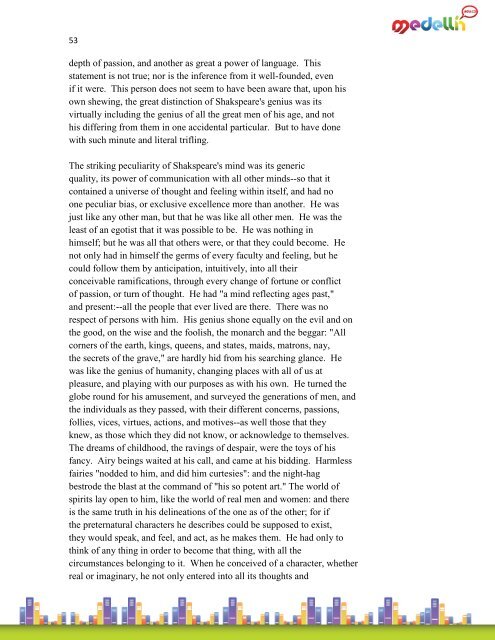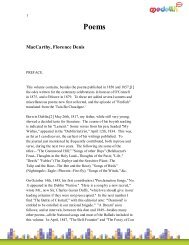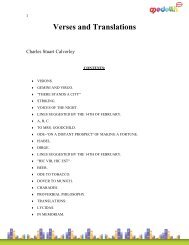Lectures On The English Poets William Hazlitt
Lectures On The English Poets William Hazlitt
Lectures On The English Poets William Hazlitt
You also want an ePaper? Increase the reach of your titles
YUMPU automatically turns print PDFs into web optimized ePapers that Google loves.
53<br />
depth of passion, and another as great a power of language. This<br />
statement is not true; nor is the inference from it well-founded, even<br />
if it were. This person does not seem to have been aware that, upon his<br />
own shewing, the great distinction of Shakspeare's genius was its<br />
virtually including the genius of all the great men of his age, and not<br />
his differing from them in one accidental particular. But to have done<br />
with such minute and literal trifling.<br />
<strong>The</strong> striking peculiarity of Shakspeare's mind was its generic<br />
quality, its power of communication with all other minds--so that it<br />
contained a universe of thought and feeling within itself, and had no<br />
one peculiar bias, or exclusive excellence more than another. He was<br />
just like any other man, but that he was like all other men. He was the<br />
least of an egotist that it was possible to be. He was nothing in<br />
himself; but he was all that others were, or that they could become. He<br />
not only had in himself the germs of every faculty and feeling, but he<br />
could follow them by anticipation, intuitively, into all their<br />
conceivable ramifications, through every change of fortune or conflict<br />
of passion, or turn of thought. He had "a mind reflecting ages past,"<br />
and present:--all the people that ever lived are there. <strong>The</strong>re was no<br />
respect of persons with him. His genius shone equally on the evil and on<br />
the good, on the wise and the foolish, the monarch and the beggar: "All<br />
corners of the earth, kings, queens, and states, maids, matrons, nay,<br />
the secrets of the grave," are hardly hid from his searching glance. He<br />
was like the genius of humanity, changing places with all of us at<br />
pleasure, and playing with our purposes as with his own. He turned the<br />
globe round for his amusement, and surveyed the generations of men, and<br />
the individuals as they passed, with their different concerns, passions,<br />
follies, vices, virtues, actions, and motives--as well those that they<br />
knew, as those which they did not know, or acknowledge to themselves.<br />
<strong>The</strong> dreams of childhood, the ravings of despair, were the toys of his<br />
fancy. Airy beings waited at his call, and came at his bidding. Harmless<br />
fairies "nodded to him, and did him curtesies": and the night-hag<br />
bestrode the blast at the command of "his so potent art." <strong>The</strong> world of<br />
spirits lay open to him, like the world of real men and women: and there<br />
is the same truth in his delineations of the one as of the other; for if<br />
the preternatural characters he describes could be supposed to exist,<br />
they would speak, and feel, and act, as he makes them. He had only to<br />
think of any thing in order to become that thing, with all the<br />
circumstances belonging to it. When he conceived of a character, whether<br />
real or imaginary, he not only entered into all its thoughts and

















